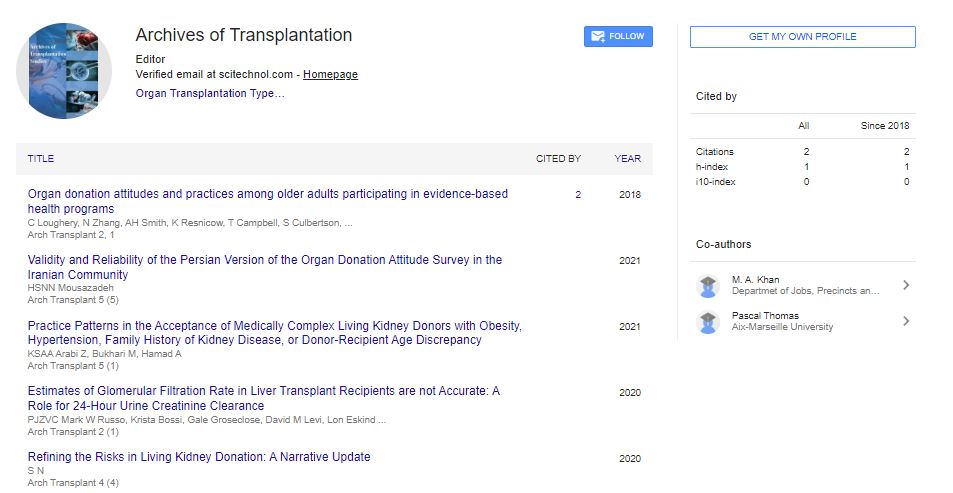Editorial, Arch Transplant Vol: 5 Issue: 5
Organ Transplantations Tissues Might be Given to be Relocated with Beneficiary
Konrad Hoetzenecker*
Division of Thoracic Surgery, Medical University of Vienna, Vienna, Austria
*Corresponding Author: Hoetzenecker K, Division of Thoracic Surgery, Medical University of Vienna, Vienna, Austria, E-mail: konrad.hoetzeneckeru@meduniwien.ac.at
Received date: September 01,2021; Accepted date: September 15,2021; Published date: September 23, 2021
Keywords: Organ
Introduction
Organ gift is the cycle when an individual permits their very own organ to be eliminated and relocated to someone else, lawfully, either by assent while the giver is alive or dead with the consent of the closest relative. Gift might be intended for research or, all the more ordinarily, sound transplantable organs and tissues might be given to be relocated into someone else. Normal transplantations incorporate kidneys, heart, liver, pancreas, digestive organs, lungs, bones, bone marrow, skin, and corneas. A few organs and tissues can be given by living contributors, like a kidney or part of the liver, part of the pancreas, part of the lungs or part of the digestion tracts yet most gifts happen after the benefactor has kicked the bucket. Organ givers are normally dead at the hour of gift, yet might be living. For living givers, organ gift normally includes broad testing before the gift, including mental assessment to decide if the eventual benefactor comprehends and agrees to the gift. Upon the arrival of the gift, the benefactor and the beneficiary show up at the clinic, actually like they would for some other significant medical procedure. For dead givers, the interaction starts with confirming that the individual is without a doubt perished, deciding if any organs could be given, and getting assent for the gift of any usable organs. Typically, nothing is done until the individual has as of now passed on, despite the fact that in case demise is inescapable, it is feasible to check for agree and to do some straightforward clinical trials in the blink of an eye ahead of time, to assist with tracking down a coordinating with beneficiary. The check of death is ordinarily done by a nervous system specialist a doctor gaining practical experience in cerebrum work that isn't engaged with the past endeavors to save the patient's life. This doctor steers clear of the transplantation interaction. Check of death is frequently done on various occasions, to keep specialists from disregarding any excess indication of life, but little. After death, the emergency clinic might keep the body on a mechanical ventilator and utilize different techniques to keep the organs in great condition. Benefactors and their families are not charged for any costs identified with the gift. The careful interaction relies on which organs are being given. the body is ordinarily re-established to as ordinary an appearance as could really be expected, so the family can continue with memorial service customs and either incineration or internment. The lungs are profoundly helpless against injury and consequently the hardest to safeguard, with just 15–25% of gave organs used. The term assent is regularly characterized as a subject sticking to an arrangement of standards and guidelines; in any case, the definition becomes hard to execute concerning the subject of organ gift, chiefly on the grounds that the subject is unequipped for agree because of death or mental debilitation. There are two sorts of assent being evaluated; unequivocal assent and assumed assent. Express assent comprises of the contributor giving direct assent through legitimate enrolment relying upon the country. The subsequent assent measure is assumed assent, which doesn't require direct assent from the giver or the closest relative. Assumed assent accepts that gift would have been allowed by the expected contributor in case authorization was sought after. Of potential contributors an expected 25 percent of families won't give a friend or family member's organs. Thus, nations, like Wales, have embraced a delicate quit assent, which means in the event that a resident has not obviously settled on a choice to enrol, they will be treated as an enlisted resident and partake in the organ gift measure. Moreover, pick in agree alludes to the assent cycle of just the individuals who are enlisted to partake in organ gift. Right now, the United States has a select in framework, however concentrates on show that nations with a quit framework save more lives because of greater accessibility of gave organs. The current select in assent strategy accepts that people are not ready to become organ contributors at the hour of their passing, except if they have recorded in any case through organ gift enlistment.
